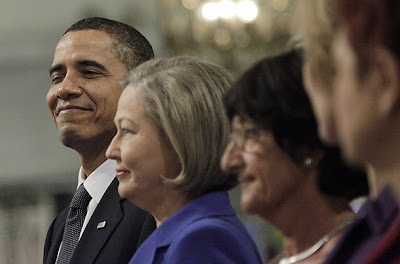 President Obama formally accepted the Nobel Peace Prize last week in Oslo. Per tradition, the president addressed the distinguished audience with a "Nobel lecture". His speech has been discussed and debated by everyone from Glenn Beck to Hugo Chavez.
President Obama formally accepted the Nobel Peace Prize last week in Oslo. Per tradition, the president addressed the distinguished audience with a "Nobel lecture". His speech has been discussed and debated by everyone from Glenn Beck to Hugo Chavez.Even those who disagree with the president would undoubtedly agree that he is at least true to himself and his principles. Almost a year into his presidency, it's hard to deny that he is exactly who he said he would be and that he is doing exactly what he said he would do.
I won't apologize for being a fan of him; there are few who can so comfortably inhabit the spotlight. There are fewer still who can know, understand and speak to the moment while being in the spotlight. Beyond that, who else could get away with talking about the "law of love"? Moreover, it's hard to compute that an American president talked about the law of love in the same speech as warning the world that the United States won't hesitate to use its military might to protect its citizens. What is love?
"the human condition can be perfected"Gene Roddenberry would be proud to live in a country with such an unabashedly humanist president. President Obama's speech also served as a perfect example of why I wouldn't want anyone else to be in the White House. He isn't perfect. He will most likely make mistakes during his time in office. The underlying philosophy that seems to guide his thinking, though, is that humans have great potential for good; they only require important and well-maintained institutions to help mitigate the bad stuff.
"fundamental faith in human progress"
"the spark of the divine that stirs in each of us"
What of peace, though? It didn't surprise me that he referenced King, Ghandi and Kennedy; it shocked the hell out of me, however, when his conclusion for potential peace was "the continued expansion of our moral imagination."
I have been dwelling on that phrase for days. What does it mean? I'm convinced that it means something; he is, after all, no Palin (mindlessly filling empty space with meaningless blather). I suppose it has to do with perspective; perhaps President Obama is suggesting that no peace is possible until all parties believe that it is possible.
Does the world, then, need some big bowl of magic, geopolitically fuzzy koolaid to really create peace? Is the president suggesting that we should, a la Rodney King, all just get along? No, of course not. Clearly, though, hope was not just a campaign slogan. I really think he believes that personal determination and political will and a massive, communal paradigm shift are the main drivers of world peace. It's a choice. This method, of course, is a far cry from the more...tactile...foreign policy that Cheney and Rumsfeld espoused. It doesn't surprise me in the least that our former vice president's head is about to explode over President Obama's choices.
Peace is a choice, Obama (and Roddenberry) would say. The speech in Oslo last week amounted to, in my opinion, Choose to be with us, or get the hell out of our way.
Peace or utter destruction...it's up to you.
-Captain Kirk
Comments
Post a Comment